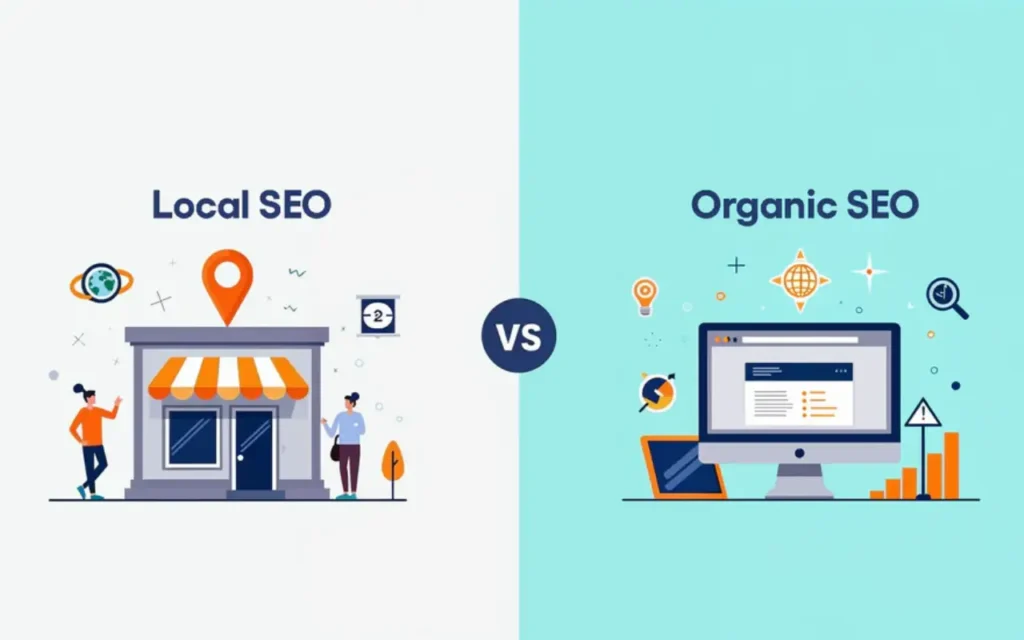Today, businesses or organizations are ensuring that they are getting the right ways to boost online presence for their business. Where Both “Local SEO” and “Organic SEO” are the important players in the growth game of businesses. These are both subcategories of Search Engine Optimization, but they may differ in purpose and correspond to different business needs. The key to knowledge of their differences can give businesses the right strategy for their SEO goal.
This article makes several differences between Local and Organic SEO that may help businesses create more effective strategies. Additionally, we will delve into the understanding of Local and Organic SEO, key benefits of Local and Organic SEO, and best practices of Organic SEO and best strategies of Local SEO.
Understanding of Local SEO
In the context of “Local SEO”, the online presence of businesses is optimized for the customers belonging to a particular geographic region. Local SEO gains much demand among businesses that have a fixed location or offer services to customers within a specific geographical area. In this process, through Google My Business Profile(GMB) optimization and localization, Local SEO makes the business visible in local search results.
How Does Local SEO Work?
Local SEO is basically based on best practices of optimizing a business for local search in a particular region or geographical area. Many of those searches contain “near me” or location-specific keywords such as “Best SEO Services in Jaipur”, and “Top Digital Marketing Agency in Mumbai”. All this below comes under Local Seach Engine Optimization:
- Google Business Profile creation and management,
- Standardized NAP(Name, Address,Phone)
- Generating Reviews on different rating platforms
- Leveraging it for targeting location-based keywords
Use-Cases of Local SEO
- Restaurants and Cafes: Local SEO best strategies can display such businesses in the local results for users when they search for a restaurant or a cafe near them.
- Local Service Providers: Plumbers, electricians, etc, can come up in area-specific searches.
- Retail Outlets or Stores: Location details and promotions will pull people into the actual stores.
- Health Care Practices: Hospitals, clinics, dentist, and other health services can attract their patients in their locality using the best Local SEO Practices.
- Realtors or Estate Agents: Local SEO connects local realtors with potential buyers and sellers in a given area.
Key Advantages of Local SEO
- Improved Visibility: Local SEO practices ensure that your business will feature in local search results, maps, and directories.
- Conversion: Locally targeted searches tend to often have a high intent degree, therefore quickening conversions.
- Better Community Engagement: Local Search Engine Optimization helps build relations with local customers and drives foot traffic.
- Cost-Effective Marketing: This focuses on a defined audience rather than squandering time and effort on broader campaigns.
- Boosts Credibility: The positive reviews and accuracy in local listings enhance the level of trust.
What is Organic SEO?
Organic SEO refers to the best practices for optimizing a business website to improve its visibility and ranking on Search engine results pages. It does not depend on paid advertisements, focusing on attracting high-quality and relevant traffic without any paid ad campaign. Organic SEO uses strategies that align with search engine algorithms.
Organic SEO practices optimize your business website for a higher position on search engines within free, unpaid, non-local search engine results. It’s aimed at improving wider and more overall visibility through keywords, quality content, backlinks, and an effective structure of your website.
How Does Organic SEO Work?
Organic Search Engine Optimization is based on two main elements: On-page optimization and Off-page Optimization. On-page Optimization includes meta tags, headings, and keyword usage while Off-page optimization includes link building and authoritative backlinks. The metrics involve both website performance and user engagement that are considered by algorithms when ranking websites within SERPs.
Use-Cases of Organic SEO
- E-commerce Websites: Organic SEO helps provide ranks for product-based search online stores and shopping websites across a country, the world, or anywhere else.
- Blogs and Publishers: Organic SEO practices optimize rankings of keywords, niche topics, and general content to get more traffic.
- SaaS(Software-as-a-Service): This helps an application by attracting the right users through ranking search terms that carry solutions.
- Education Websites: It increases the visibility of the website by using its classes or resources so that it appears at the very top of the results.
- Travel Business Sites: The sites can attract visitors as they rank travel-related keywords and tips.
Organic SEO Key Benefits
- Wider Audience: Using Organic SEO, businesses can reach much more audiences with no geographical constraints.
- Cost-Effective Solution: It’s cost-effective in the long term because organic SEO offers long-term traffic.
- Enhanced Authority: This enhances the influence of well-written content and incoming links.
- Better User Experience: It enhances user experience since it helps to optimize websites to ensure easy navigation and fast loading, and generally improves usability on web pages.
- Scalable Results: Outcomes are scalable since though with continued efforts, growth of traffic is exponential.
Local Search Engine Optimization Strategies
- Google Business Profile Optimization: All the details entered must be accurate and up to date upload pictures, and make posts consistently.
- Use Local Keywords: Leverage the Keywords that reflect where the business lies. These keywords must be included in the body of the text, meta tag, as well as headings.
- Reviews from Local Users: Engage satisfied local customers to write reviews about the particular website or store’s products on Google as well as other relevant review and rating sites such as Trustpilot, Glassdoor, Yellowpages, and Sitejabber.
- Consistency of NAP: Name, Address, and Phone number should always appear uniformly in all listings.
- Local Citations: List your business in any local directories like Yelp, TripAdvisor, or niche-specific listing website.
Organic SEO(Search Engine Optimization) Best Practices
- Proper Keyword Research: Find the most high-volume with low-competition keywords for your audience.
- Create Quality Content: Write informative, engaging, and SEO-friendly blog posts or articles to post on your website.
- Backlink Acquisition: Obtain high-quality links from trusted and relevant sites.
- Optimize On-page Elements: On-page elements including Meta tags, headers, alt text, and URLs should be optimized for better recognition on search engines.
- Enhance User-Expeirence: Speed up your website speed, improve page-loading time, mobile-friendliness, and general user experience.
Which One is the Best? Local or Organic SEO?
Choosing Local or Organic SEO depends on your business model.
- Local SEO would be perfect for businesses or companies that want to target an audience in a given specific geographic area.
- Organic SEO would be more suitable for businesses targeting a global or nationwide audience, for example, for e-commerce sites or blogs.
Mostly, both strategies work jointly. For example, when an e-commerce firm operates its business in a local area relying on Local SEO for clients within the radius, and Organic SEO to attract visitors to the website.
Why Choose Dotspace for Local and Organic SEO?
- Tailor-made Strategies: Dotspace comes up with particular SEO strategies as aligned with the aims and objectives of your business and target audience.
- Professional Team: All our experienced SEO experts are well aware of all the new updates and algorithms.
- Proven Results: We have been able to ensure businesses in various sectors get higher rankings more frequently as well as produce higher conversion rates.
- Holistic Strategy: From Local SEO to Organic SEO, we offer a comprehensive strategy for complete visibility for local businesses or worldwide websites.
- Transparent Reporting: Periodic reports keep you updated with the output of your campaign and ROI.
Conclusion: Local vs. Organic SEO
Building online visibility and driving traffic, both Local and Organic SEO have much in it. Though they cater to different objectives, integration gives businesses something more beyond their competitors. Through the right SEO partner, such as Dotspace, ensure your business gets the expertise needed to grow within the online space.






